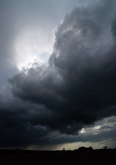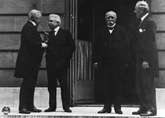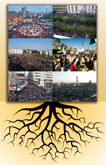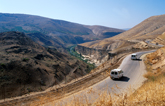

{image_1}Traditionally, storm clouds visit Israel only in the winter months. But this year, storm clouds of war, conflict, and threats are brewing—and they may reach Israel and the region anytime. In some cases, rain drops are already falling and raising concerns of hurricanes to come. Iran’s nuclear program continues to be at the forefront of Israel’s concerns, but a host of other dangers are making for a very dark horizon.
Continue Reading »
The saga of Israel’s standing under international law began long before the United Nations was a player on the global scene. As early as the turn of the 20th century, a number of Bible-believing statesmen and politicians, many of them British, were adamant in their support of the return of the Jewish people to their ancient homeland in fulfillment of Bible prophecy.
Continue Reading »
{image_2} On September 21, 2011, US President Obama proclaimed at the UN General Assembly, “There is one issue that stands as…a test for American foreign policy, and that is the conflict between the Israelis and the Palestinians.” President Obama assumes that the Palestinian issue is a root cause of Middle Eastern turbulence, the crown jewel of Arab policy-making, and the crux of the Arab–Israeli conflict. Is it?
Continue Reading »
{image_1}Israel’s relationship with Europe is complex to say the least. Anti-Semitism is on the rise, and Israel is routinely assailed by pro-Palestinian activists on the continent. At the same time, Germany has sold multiple nuclear submarines to Israel, and the British finally changed a law that results in less legal harassment for Israeli officials visiting the country. Two of Israel’s closer friends have recently been forced out of power, but one of their stronger critics was too. So, is the relationship getting better, worse, or staying the same? It depends on where you look.
Continue Reading »
{image_1}Legend has it that a scorpion and a camel were sitting on the shores of the River Nile one hot summer’s day. The scorpion asks the camel to allow him to sit on his hump in order to ride to the other side. Scorpions, as is commonly known, can’t swim. Reluctantly the camel agrees. Half way across, the scorpion stings the camel. Realizing they’re now both going to drown, the startled camel asks the scorpion, ”Why?” With a grin, the scorpion answers, ”Welcome to the Middle East.”
Continue Reading »
{image_1}One of Gilad Shalit’s comments during his first interview upon his release was that he had imagined himself in captivity for many more years. And he was not alone. Although there was tremendous momentum worldwide to secure his freedom, many, if not most, authorities on the subject viewed it as a hopeless situation.
Continue Reading »
{image_1}No one can say when the next war will come, but when it does, Israel’s main cities will almost certainly come under sustained bombardment by thousands of tons of warheads. That scenario has the military commanders responsible for protecting its citizens in a frenzy of preparedness. Across the country this summer, Israelis were subject to home front drills, sending people scurrying into shelters, sirens blaring and gas masks distributed. Defense planners want to use underground parking garages and road tunnels as massive bomb shelters.
Continue Reading »
{image_1}There is a word in Hebrew that is used often in certain segments of Israeli society that denotes a very important but strangely illusive concept for the modern state. The word is hasbara, and it refers to Israel’s public diplomacy efforts. It is a noun that actually means “explanation,” and many from Israel, including her Christian friends, are engaged in what is called “doing hasbara.” It is traditionally one of the few things that the nation of Israel has not excelled at.
Continue Reading »
{image_1} It’s perhaps the most oft-mentioned year in Israeli–Palestinian diplomacy, and yet it might be the worst understood concept in the decades-old conflict. Discussed by politicians and commentators alike, the 1967 “borders” have been presented even by US President Barack Obama as a starting point for Israeli–Palestinian negotiations. There are numerous problems with that approach, not the least of which is that the 1967 lines are not borders, nor have they ever been.
Continue Reading »
{image_1}The scenario is presented as dramatic and disturbing: Sometime this September, the United Nations could recognize Palestinian statehood in terms Israel could never accept for historic or security reasons. As a result, it is feared Israel could be cast into a diplomatic tailspin that could culminate in international sanctions and even conflict. It’s presented as one of Israel’s worst nightmares, and opinions expressed in Israeli media from the Left and the Right are already sounding the alarm. But are the fears justified? Is Israel really facing its worst diplomatic crisis in decades? Or is the whole scenario a Palestinian fantasy?
Continue Reading »All logos and trademarks in this site are property of their respective owner. All other materials are property of Bridges for Peace. Copyright © 2025.
Website Site Design by J-Town Internet Services Ltd. - Based in Jerusalem and Serving the World.